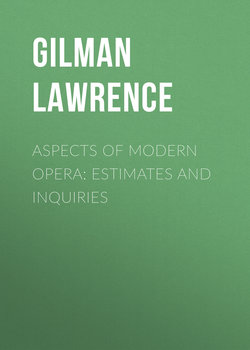Aspects of Modern Opera: Estimates and Inquiries

Реклама. ООО «ЛитРес», ИНН: 7719571260.
Оглавление
Gilman Lawrence. Aspects of Modern Opera: Estimates and Inquiries
INTRODUCTORY. THE WAGNERIAN AFTERMATH
A VIEW OF PUCCINI
STRAUSS’ “SALOME”: ITS. ART AND ITS MORALS
A PERFECT MUSIC-DRAMA
Отрывок из книги
A plain-spoken and not too reverent observer of contemporary musical manners, discussing the melodic style of the Young Italian opera-makers, has observed that it is fortunate in that it "gives the singers opportunity to pour out their voices in that lavish volume and intensity which provoke applause as infallibly as horseradish provokes tears." The comment has a good deal of what Sir Willoughby Patterne would have called "rough truth." It is fairly obvious that there is nothing in the entire range of opera so inevitably calculated to produce an instant effect as a certain kind of frank and sweeping lyricism allied with swiftness of dramatic emotion; and it is because the young lions of modern Italy – Puccini and his lesser brethren – have profoundly appreciated this elemental truth, that they address their generation with so immediate an effect.
In those days when the impetus of a pristine enthusiasm drove the more intelligent order of opera-goers to performances of Wagner, it was a labour of love to learn to know and understand the texts of his obscure and laboured dramas; and even the guide-books, which were as leaves in Vallombrosa, were prayerfully studied. But to-day there are no Wagnerites. We are no longer impelled by an apostolic fervour to delve curiously into the complex genealogy and elaborate ethics of the "Ring," and it is no longer quite clear to many slothful intelligences just what Tristan and Isolde are talking about in the dusk of King Mark's garden. There will always be a small group of the faithful who, through invincible and loving study, will have learned by heart every secret of these dramas. But for the casual opera-goer, granting him all possible intelligence and intellectual curiosity, they cannot but seem the reverse of crystal-clear, logical, and compact. A score of years ago those who cared at all for the dramatic element in opera, and the measure of whose delight was not filled up by the vocal pyrotechny which was the mainstay of the operas of the older répertoire, found in these music-dramas their chief solace and satisfaction. Wagner reigned then virtually alone over his kingdom. The dignity, the imaginative power, and the impressive emotional sweep of his dramas, as dramas, offset their obscurity and their inordinate bulk; and always their splendid investiture of music exerted, in and of itself, an enthralling fascination. And that condition of affairs might have continued for much longer had not certain impetuous young men of modern Italy demonstrated the possibility of writing operas which were both engrossing on their purely dramatic side and, in their music, eloquent with the eloquence that had come to be expected of the modern opera-maker. Moreover, these music-dramas had the incalculable merit, for our time and environment, of being both swift in movement and unimpeachably obvious in meaning. Thereupon began the reign of young Italy in contemporary opera. It was inaugurated with the "Cavalleria Rusticana" of Mascagni and the "I Pagliacci" of Leoncavallo; and it is continued to-day, with immense vigour and persistence, by Puccini with all his later works. The sway of the composer of "Tosca," "Bohème," and "Madame Butterfly" is triumphant and wellnigh absolute; and the reasons for it are not elusive. He has selected for musical treatment dramas that are terse and rapid in action and intelligible in detail, and he has underscored them with music that is impassioned, incisive, highly spiced, rhetorical, sometimes poetic and ingenious, and pervadingly sentimental. Moreover, he possesses, as his most prosperous attribute, that facility in writing fervid and often banal melodies to the immediate and unfailing effect of which, in the words of Mr. Henry T. Finck, I have alluded. As a sensitive English critic, Mr. Vernon Blackburn, once very happily observed, Puccini is "essentially a man of his own generation … the one who has caught up the spirit of his time, and has made his compact with that time, in order that he should not lose anything which a contemporary generation might give him."
.....
It is in "Tosca" that he should be studied. He is not elsewhere so sincere, direct, pungent, telling. And it is in "Tosca," also, that his melodic vein, which is generally broad and copious rather than fine and deep, yields some of the true and individual beauty which is its occasional, its very rare, possession – for example, to name it at its best, the poetic and exceedingly personal music which accompanies the advancing of dawn over the house-tops of Rome, at the beginning of the last act: a passage the melancholy beauty and sincere emotion of which it would be difficult to overpraise.
In Puccini's later and much more elaborate and meticulous "Madame Butterfly," there is less that one can unreservedly delight in or definitely deplore, so far as the music itself is concerned. It is from a somewhat different angle that one is moved to consider the work.
.....